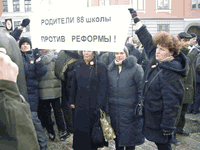"Foreigners" to be liquidated?
 Latvian president Vaira Vike-Freiberga has signed an Education law on Friday, which has been amended by Latvian delegates of the Seym. They limited teaching procedures in senior classes in those languages of national minorities (or as Latvian delegates prefer to call them- “foreigners”).
Latvian president Vaira Vike-Freiberga has signed an Education law on Friday, which has been amended by Latvian delegates of the Seym. They limited teaching procedures in senior classes in those languages of national minorities (or as Latvian delegates prefer to call them- “foreigners”).
Consequently, starting September 1 of this year, 60% of all subjects in the so-called “foreign schools” will be taught in the country's official language. The same requirement concerns State’s and municipal schools, where the teaching will be conducted in Latvian from the first grade. The law will be effective February 27.
Mass demonstrations of senior students from Russian-language schools have taken place last Wednesday in Riga, Daugavpils and Elgav. The students have been demonstrating against such amendments. However, these demonstrations (sources indicate that more than 20 000 people participated in the demonstrations) did not have any effect on the Latvian president. Well, she did indeed manage to defend “interests of the Latvian government.” But what's next?
It is virtually impossible to perceive the real goal those Latvian officials intended to achieve. One may argue that Latvians were on a verge of losing their national identity and therefore had to take all the necessary precautions in order to “save” themselves. At the same time, it is hard to say how Russian schools threaten Latvian “national identity”…Perhaps, somehow they do…
However, there is also a positive “achievement”. Today, Latvia “advantageously” differs not only from Finland and Switzerland, but also from its closest neighbors—Lithuania and Estonia. The latter, for some reason, are not “threatened” by the Russian language. However, according to Latvian authorities, their neighbors have fewer “foreigners”.
Back in 1999, when Vaira Vike-Freiberga became the country’s president, she had promised to learn Russian language. Five years have passed since then. Nowadays, Latvian president prefers to keep her knowledge of the language to herself. In the meantime, 37% of Latvian population considers Russian their native tongue.
Persistency of Latvian authorities cannot be explained from the standpoint of political pragmatism. Otherwise, neither one of the amendments would have been introduced in the first place. Delegates of the Seym along with ministers and the president herself have been most likely triggered by emotional impulses rather than logical ones. In this respect, their actions do not differ much from students, their parents and teachers who demonstrated against such actions. On the other hand, the country's government is fully responsible for the split of Latvian society. Most likely, it feels ready to hold such responsibility…
Subscribe to Pravda.Ru Telegram channel, Facebook, RSS!





